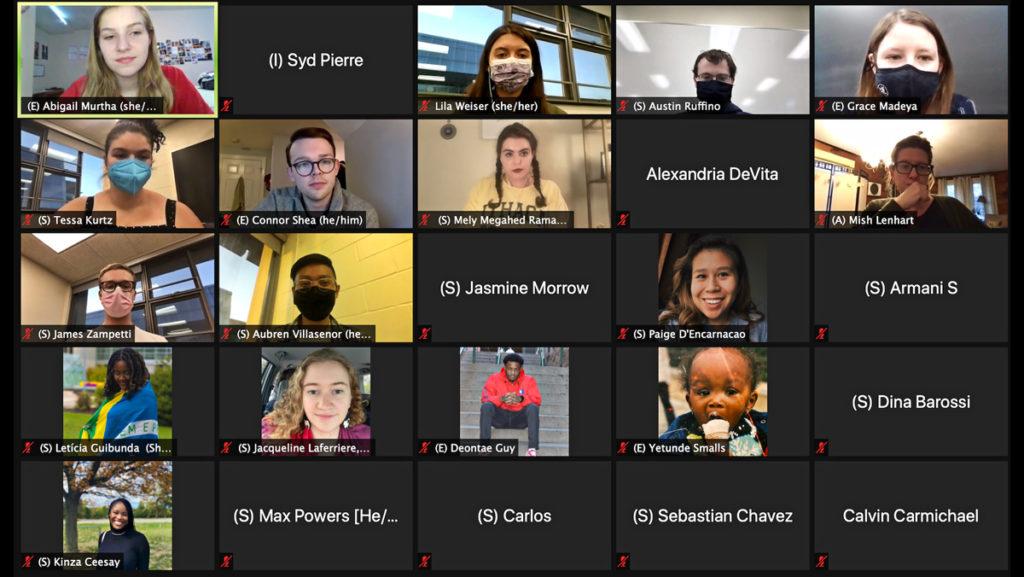The Ithaca College Student Governance Council (SGC) passed one bill related to its election processes and provided updates on previously passed bills at its March 22 meeting.
The SGC passed the Elections Act bill with a vote of 18–0 with no abstentions. The 14-page document explains the process behind elections for the SGC.
The act was created by the Organizational Review Committee (ORC) within the SGC. Senior Connor Shea, president of the SGC, said the act was created to provide more clarifications on the process behind elections, both for possible candidates and members of the SGC.
The act includes sections that explain the elections committee, SGC senator and executive board selection, campaign procedures and the voting process for SGC elections.
Shea said some of the biggest changes include that the SGC is no longer sponsoring the senior class elections monetarily or logistically and that the Elections Act includes more details about fall elections.
“This Elections Act is in line with what we have been doing for the past maybe a couple of semesters and plan to do moving forward,” Shea said.
The SGC also provided updates on previously passed bills.
Senior Agnes Scotti, Class of 2021 senator, said she had not heard back from the administration after they confirmed they had received the three bills she sponsored. The No Confidence in Shape of the College Recommendation resolution, the 2021 Ithaca College Financial Transparency recommendation and the Election Day Holiday Act were all passed at the SGC’s Feb. 22 meeting.
In an interview with The Ithacan on March 1, President Shirley M. Collado and La Jerne Cornish, provost and senior vice president for academic affairs, said they would not be accepting the recommendations from the bills.
“Both bills, the petition and the bill, ask us to reject the recommendations from the [Academic Program Prioritization Implementation Committee] committee,” Cornish said in the interview. “And we did not do that. And we’re not going to do that.”
Junior Sebastian Chavez, Students of Color Coalition (SOCC) senator, also sponsored the No Confidence in Shape of the College Recommendation resolution and the 2021 Ithaca College Financial Transparency recommendation. He said he had been trying to set up a meeting with Rosanna Ferro, vice president for student affairs and campus life, to discuss the bills.
“There’s a deeper issue that’s going on with these bills,” Chavez said. “So we’re trying to set up a meeting with SOCC, [Asian American Alliance], myself, SGC and Open the Books members discussing the bills because they have not been acknowledged, and that is a major issue, especially as students, especially as senators.”
Senior Yetunde Smalls, vice president of academic affairs of the SGC, said she had met with Ferro on March 17. Smalls said that Ferro said one of the reasons the SGC had not heard back yet was because the administration wanted to make sure they were being thorough when reading the bills.
The SGC also discussed the statement put out by the Senior Leadership Team (SLT) regarding the recent rise in violence against Asian and Asian-American communities. The statement was released following the shooting on March 16 in Atlanta that killed six women of Asian descent.
Some members of the SGC said they were unhappy with the lack of clarity in the statement regarding the shooter’s anti-Asian motives. The original statement said, “While the motive for the Tuesday killings of six Asian women in the Atlanta area remains unclear at this time, it is evident that the targeting of members of Asian communities has increased across our nation.” The statement has since been revised to say, “It is evident that the targeting of members of Asian communities has increased across our nation, and we grieve for the victims of Tuesday’s killings in the Atlanta area and the fear that it provokes.”
Chavez said he was in the process of coordinating a roundtable discussion for organizations and clubs for students of color at the college.
“It’s time for the BIPOC community to take matters into their own hands,” Chavez said. “And what does that mean? That means that we finally call out our administration, and finally go publicly that even though our administrators, Dr. Ferro, Cornish and Collado are BIPOC members and they are BIPOC individuals, does not mean we have to support them just because they’re BIPOC.”









